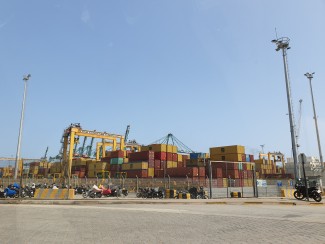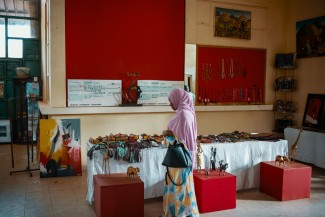Public-private dialogues are reducing trade barriers – and saving poultry traders costly journeys to renew import permits.
Poultry farmers in Oudomxay, a province in the northwest of the Lao People’s Democratic Republic, were chocking on red tape. To source day-old chicks from neighboring China, they were required to apply for import permits from the provincial Department of Agriculture and Forestry, which then sent these upwards to the ministry for further approval.
It was costly and time-consuming. So, the farmers and traders in the poultry industry sat down to think of a solution to the problem. Instead of piece-meal applications up and down the bureaucratic chain, why couldn’t the Ministry of Agriculture and Forestry issue annual poultry import permits, which officials at the provincial level could check every time the imports came through?
The government officials considered the proposal and agreed that not only would it quicken things up for the poultry traders, but it would also reduce their own workload. A new process was designed. The poultry importers estimate their annual needs and apply for one import permit to cover the year. The approved permit is sent to the preferred border posts and the traders then operate freely. Only when the imports exceed the number in the permit do the importers ask for another permit from the central government authorities. Otherwise, the chickens keep crossing the road unfettered.
This small example of problem-solving is being replicated across Laos, a mountainous, landlocked least developed country in Asia surrounded by China, Myanmar, Thailand, Vietnam and Cambodia.
The idea can be traced back to 2005 when the Lao Business Forum was set up to provide a structured platform in which the business community could engage meaningfully with the government on issues affecting them, including trade facilitation and tax administration. This translated into a national-level dialogue held once a year and where the country’s prime minister and senior government officials sit with private sector representatives and try to find common ground.
In 2020 a project supported by the Enhanced Integrated Framework began to make the dialogues more accessible to stakeholders in Luangnamtha, Oudomxay and Phongsaly provinces in northern Lao, which are key producers of maize, rice and tea. The aim of supporting the local public-private dialogues was to address specific local business environment issues, especially those related to the inconsistent application of laws and regulations at the local levels, to remove barriers that businesses face in their operations.
The dialogues also support the participation and representation of local businesses in local-level policy making and at the National Lao Business Forum, says Ms. Lattanaphone Vongsouthi, Director of EIF's National Implementation Unit in the Ministry of Industry and Commerce.
Chambers of commerce in each province organize businesses in clusters according to sectors. The businesses identify issues affecting them and generate a position paper in which they specify their recommendations on what they want government agencies to do, or stop doing. Since 2020, dialogues have been held in the three provinces between key government officials and representatives from eight major business groups.
Many of the issues that emerge from the different provinces are similar; bureaucratic procedures and fees that slow down trade and increase the cost of doing business, lack of access to affordable finance, and lack of information about available opportunities, including export quotas or standards from key markets, high costs of licensing and meeting environmental standards, difficulties in accessing to investment incentives, and inconsistent tax rates.
But some, like the poultry imports, can be unique to provinces and sectors. In Phongsaly province, for instance, local tour operators deplored that foreign tourists had stopped buying local souvenirs because of export taxes charged on them as they left the country.
Up to this point, position papers have been prepared on 35 specific issues identified and prioritized in the three provinces. By describing the nature of the problem, its impact, and specific recommendations for solving it, the position papers facilitate constructive dialogue between private sector and relevant government agencies at local level.
Avoiding blame-games and focusing, instead, on proposing solutions has improved trust and cooperation between the public and private sectors. The project has helped build the capacity of local chambers of commerce to organise and undertake successful local dialogues and feed into the national conversation.
About a quarter of all issues identified have been fully resolved and this problem-solving builds more trust between the parties, and confidence in the process. The project has also taught citizens simpler ways of launching new businesses while giving local officials a front-row seat to understand the challenges in starting businesses, importing inputs or exporting agricultural products to neighbouring countries.
"Providing new and more efficient ways to launch small businesses has expanded opportunities for more people in remote areas to benefit from trade," said Aphisid Sengsourivong, Director-General of Department of Enterprise Registration and Management, Ministry of Industry and Commerce.
As ideas percolate upwards from the provinces to the national stage, they are feeding into and complementing other ongoing business environment reform programs in the country, including trade facilitation, improving Laos’ overall business enabling environment, or implementing government COVID-19 response measures.
Following the success of the project, the dialogue model is currently being replicated in the southern part of the country through USAID support.
There is still a long way to go, but the example of the poultry traders in Oudomxay province shows that public officials and private sector actors can find solutions to trade challenges without ruffling feathers.
Photo by William Moreland on Unsplash
If you would like to reuse any material published here, please let us know by sending an email to EIF Communications: eifcommunications@wto.org.



